
While large businesses will usually find someone in-house, smaller ones often don’t have that option and must look toward hiring a chief compliance officer outsourced.
In this article, we’ll explain the importance of hiring a CCO, what a CCO does, the pros and cons of outsourcing a CCO, as well as what to look for when outsourcing one.
Let’s dive right in.
What is a Chief Compliance Officer?
What is a Chief Compliance Officer.png
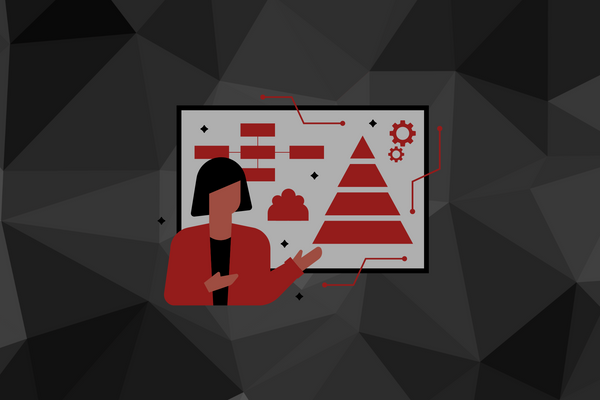
Regulations change frequently, and your business must stay on top of those changes at all times. A chief compliance officer is just the person in your team who will ensure you do that.
This is the top-level management person who oversees all compliance efforts from a 50,000-foot view.
In essence, a CCO is someone who will ensure that your business follows your industry’s legal and regulatory requirements.
Why is a Chief Compliance Officer Important?
Why is a Chief Compliance Officer Important.png

Compliance failures can seriously erode the business’ reputation with stakeholders and expose it to legal and financial losses.
The CCO plays an important role by identifying compliance vulnerabilities and ensuring they don’t lead to legal and financial problems for the business.
The chief compliance officer is also someone who will foster a culture of compliance in your firm by leading and educating employees.
What Does a Chief Compliance Officer Do?
What Does a Chief Compliance Officer Do.png
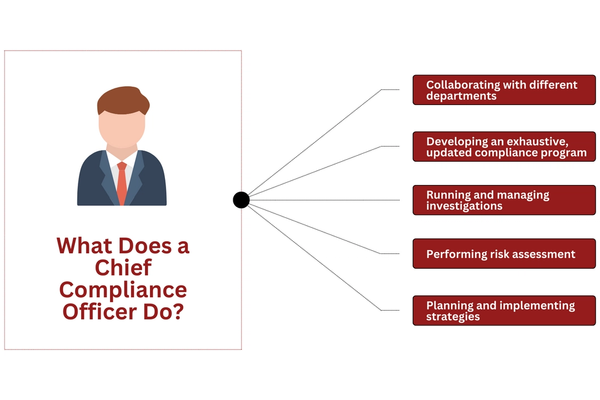
The CCO has many responsibilities and multiple roles in an organization, which I briefly touched on above. Here’s a comprehensive list of the CCO’s responsibilities:
Collaborating with different departments to ensure and promote compliance by providing guidance and assistance where it is needed
Developing an exhaustive, updated compliance program that includes policies, procedures, and control and implementing it
Running and managing investigations and taking necessary disciplinary measures in case of potential misconduct
Performing risk assessment and identifying likely compliance vulnerabilities
Planning and proposing strategies to alleviate those vulnerabilities
Analyzing laws and regulations that are relevant to their industry and keeping themselves up-to-date with any changes
Keeping the stakeholders and management briefed about any compliance developments or issues
Helping to educate employees about compliance policies and procedures through developing training programs
Creating reporting mechanisms that will help identify potential compliance problems
Championing a culture of compliance in the business
What Does Chief Compliance Officer Outsourced Mean?
Compared to an in-house CCO, an outsourced chief compliance officer will often have a wider range of experience and a better overview of the industry and market best practices.
When it comes to cost, they will also typically work on a retainer basis and with no recruitment fees. This makes them ideally suited for small and medium-sized businesses.
Outsourcing compliance can be the right choice whether your company is small or large.
This can be a cost-effective solution, but you might also not have the right person in your organization to fill that role adequately.
In a small firm, you’ll also often have to assign this role to someone who already fills another role, thus having them wear multiple hats.
However, with the growing threat of privacy breaches and cyber-attacks and the need to adequately protect sensitive personal information (SPI), an in-house chief compliance officer is a better option for high-risk businesses than an outsourced one.
Pros of Chief Compliance Officer Outsourced
Pros of Chief Compliance Officer Outsourced.png
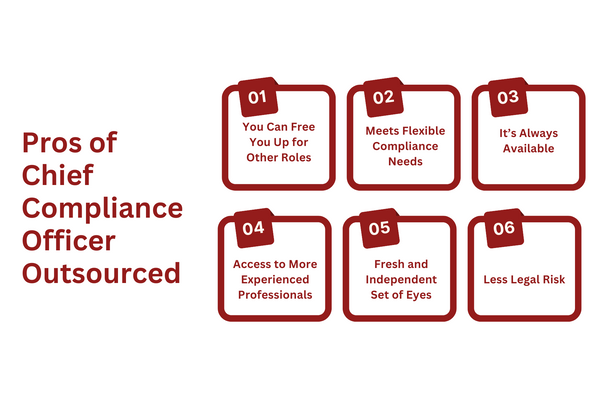
If you’re considering outsourcing the CCO in your business, then you should know what some of the benefits of doing so are.
Here are the pros of outsourcing a chief compliance officer:
You Can Free You Up for Other Roles
By outsourcing a CCO, you will have one less burden and will have more time for other projects. You won’t have to dedicate as much attention to the CCO.
Meets Flexible Compliance Needs
You don’t have to outsource all of your compliance needs. Instead, you can tailor compliance services as it fits your business.
For instance, while a smaller firm might go all-in with this, a larger one might, instead, outsource someone only to support their in-house team.
It’s Always Available
An in-house CCO might not always be available as they can go on vacation or get sick. This, however, is not the problem when working with a Compliance-as-a-Service (CaaS) company, where you can simply contact the firm or person if there are any issues.
You Get Access to More Experienced Professionals
In-house CCO will have in-depth knowledge of your business, as they most likely work with many other businesses.
Outsourcing a chief compliance officer, or a team, will mean that you’ll be working with experienced professionals, who will have a wider and more in-depth experience with other companies and industries and not just yours.
They Provide a Fresh and Independent Set of Eyes
One of the problems with an in-house chief compliance officer is the potential bias.
Simply put, even the most professional CCOs, might not always see the potential compliance issues in your organization.
An outsourced chief compliance officer, whether they work individually or to support an existing in-house CCO can offer a fresh and independent set of eyes upon your compliance strategy.
Less Legal Risk
With an in-house compliance officer or a team, the sole legal responsibility for violating compliance regulations falls on your business.
On the other hand, outsourcing your compliance will significantly mitigate this risk. Often, this risk will fall on the compliance company that you hired. Although, you’ll need to read the contract specifications, and you may have to negotiate terms.
Interested in compliance officer outsourcing? Get in touch for a free consultation today.
Cons of Chief Compliance Officer Outsourced
Cons of Chief Compliance Officer Outsourced.png
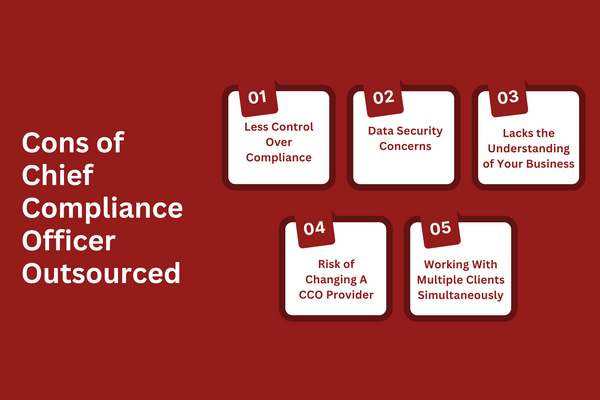
While outsourcing compliance to a 3rd party firm or individual does have its benefits, it’s not always the better choice.
Here are the drawbacks of outsourcing a CCO you should keep in mind:
Giving Away Controls and Oversight of Your Compliance to a 3rd-Party
By outsourcing compliance to another party, you are essentially handing the wheel to someone else and hoping they will take you in the right direction.
Ultimately, however, you have very little control and oversight, and you’ll need to hope you choose the right company from the get-go.
Data Security Concerns
The CCO will have access to sensitive data and information that could pose a risk if used incorrectly. As such, you should carefully consider and scrutinize whether you should outsource compliance to someone outside your business.
This especially goes if you’re in a high-risk industry for privacy breaches and cyber-attacks like finance or insurance.
Lacks the Understanding of Your Business
While an outsourced CCO might have a wider knowledge of when it comes to other businesses, industries, and markets, they may, nevertheless, lack the more nuanced and in-depth knowledge of your specific business, operations, and culture.
As a result, an in-house CCO will typically have a better understanding of your compliance requirements and potential challenges.
Risk of Changing A CCO Provider
If there’s ever a change or a transition from one outsourced CCO to another, this might lead to a lack of continuity in the process.
When that happens, the new CCO will have a higher learning curve, which could mean an increased risk of compliance issues during the transition period.
Working With Multiple Clients Simultaneously
The chief compliance officer outsourced will often not be exclusive to your business. Instead, they might work with several clients at a time.
What this will lead to is potentially limited availability, which might come into play when you need to address a compliance issue quickly.
Is Outsourcing Compliance a Good Idea?
Is Outsourcing Compliance a Good Idea.png

Outsourcing any part of your operations carries with it certain rewards and risks and outsourcing compliance is no different here.
When outsourcing compliance, rather than doing it with an in-house team, you have to consider your business needs, industry requirements, market, finances, and overall resources.
In particular, you have to look at the potential risks involved with giving 3rd-party access to your sensitive data, especially in a high-risk industry.
What to Look for in an Outsourced Chief Compliance Officer?
What to Look for in an Outsourced Chief Compliance Officer.png
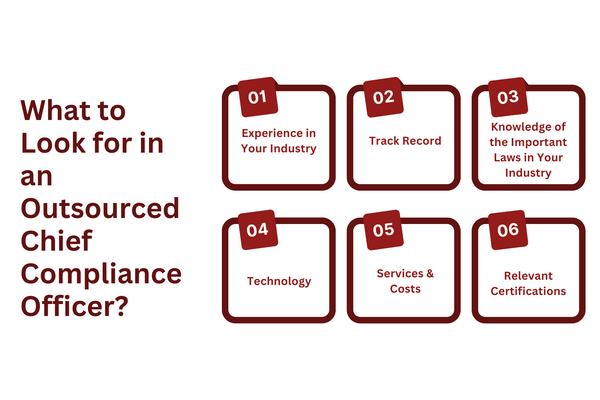
When choosing an outsourced CCO, you have to consider their skills, industry knowledge, legal and regulatory knowledge, but also their personality.
The Association of Governance Risk & Compliance recommends looking for these 6 key traits of a CCO:
Natural born leadership
Clear & concise communication
A strong moral compass
Willingness to dive into the nitty-gritty
Highly proactive
Solving problems with their eyes closed
Outsourcing a chief compliance officer brings another set of questions such as:
Experience/Expertise in Your Industry
The outsourcing company and the outsourced CCO should have relevant experience in your particular industry so they can know what compliance and regulatory challenges your company might face.
Track Record
Was the outsourced CCO successful in their job with previous clients or not? To know this, you need to look for references from past clients and projects. Review sites like Trustpilot are a good tool for this.
Knowledge of the Important Laws and Regulations in Your Industry
In the same way that the outsourced CCO should have experience in your industry, they should also have expertise in the laws and regulations, best practices, and industry standards that are relevant to your business.
Relevant Certifications
Having relevant certifications, the outsourced CCO will show their commitment to educating themselves and staying up-to-date in the field.
Some certifications include:
Certified Compliance Officer (CCO) by GAFM (Global Academy of Finance & Management
Certified Compliance & Ethics Professional (CCEP) by SCSE (Society of Corporate Compliance and Ethics
Certified Regulatory Compliance Manager (CRCM) by ABA (American Bankers Association)
Certified Fraud Examiner (CFE) by ACFE (Association of Certified Fraud Examiners)
Certified Anti-Money Laundering Specialist (CAMS) by ACAMS (Association of Certified Anti-Money Laundering Specialists)
Technology
While it’s possible for an outsourced chief compliance officer to do their job without the assistance of technology, those that do this are fast becoming relics.
With the right compliance technology solutions, the outsourced CCO can:
Better organize data
Automate certain processes and workflows
Streamline the reporting process
And overall, make the compliance processes easier to handle
Services & Costs
Do you need a full package of compliance services, and can the outsourced CCO provide this or not?
Also, what kind of support does the compliance company offer?
You need to understand what services they offer and how much you are going to pay for those services. You’ll need to set a budget for your outsourced CCO.
Want a compliance service that checks all these boxes and more? Get Contact us today for a free consultation.
What Compliance Services Can You Outsource?
Depending on your business needs, you may have to outsource all or just a part of your corporate compliance.
Here is a list of compliance services you can outsource:
Risk Assessment & Management
Assessing the risk profile, identifying vulnerabilities, and developing a risk management strategy for your business is a key service that outsourced compliance services can do.
Compliance Program Development
Compliance program development is essential for every business, as it guides everyone on what to do to meet regulations. You can outsource the development of a compliance program to comply with the industry standards and applicable laws and regulations.
Data Privacy & Security
Next, you can outsource data privacy and security-related compliance services (data protection and privacy risk assessments, data monitoring, etc.)
Compliance Training & Education
You can also outsource compliance training programs and education to your employees on matters such as anti-corruption, ethics, reporting, and far more.
Specialized Compliance
Finally, you can outsource specialized compliance services such as financial services compliance (finance reporting, accounting standards reporting, or tax reporting), EHS (environmental, health, and safety) compliance, AML (Anti-Money Laundering), KYC (Know Your Customer), HIPAA compliance, and more.
FAQs
How Much Does Outsourcing CCO Cost?
The cost of outsourcing CCO varies depending on the business, industry, and the outsourcing package. Assuming the chief compliance officer outsourced offers a full-service package, they will typically cost around 25% of what an in-house CCO does. So, if the average salary of an in-house CCO is $240,000 per year, the cost of outsourcing a CCO for a year will be $60,000.
What is Outsourced Compliance?
Outsourcing compliance allows firms to utilize the expertise and know-how of specialized compliance companies and stay abreast of regulatory changes to meet their compliance obligations at a fraction of the cost.
What is the Difference between COO and Chief Compliance Officer?
“COO” stands for “Chief Operating Officer.” Typically, this is the second-ranking person in the company, and they mostly deal with ensuring that the long-term company strategies laid out by the CEO are translated into daily operations. On the other hand, the chief compliance officer is in charge of managing all compliance efforts in the company.
Why Hire a CCO?
With regulatory compliance in most industries being exceptionally complex, this requires hiring a CCO or chief compliance officer to help manage your organization’s compliance obligations and needs.
Should a CCO Report to CFO?
Typically, the chief compliance officer will report directly to the chief executive officer (CEO) or the chief law officer (CLO) and not to the chief financial officer (CFO). Although, there may be special cases where it’s more common to report to the CFO.
What is the Highest Paid CCO?
According to Salary.com, the top 10% of CCOs in the United States receive $324,652/year.
How Can Captain Compliance Help?
Captain Compliance is the #1 solution for chief compliance officer outsourcing in the world. We have world-renowned compliance experts ready to help your company stay on top of your compliance obligations.
Get in touch for a 100% free, zero-risk consultation so you can ensure your business is compliant.